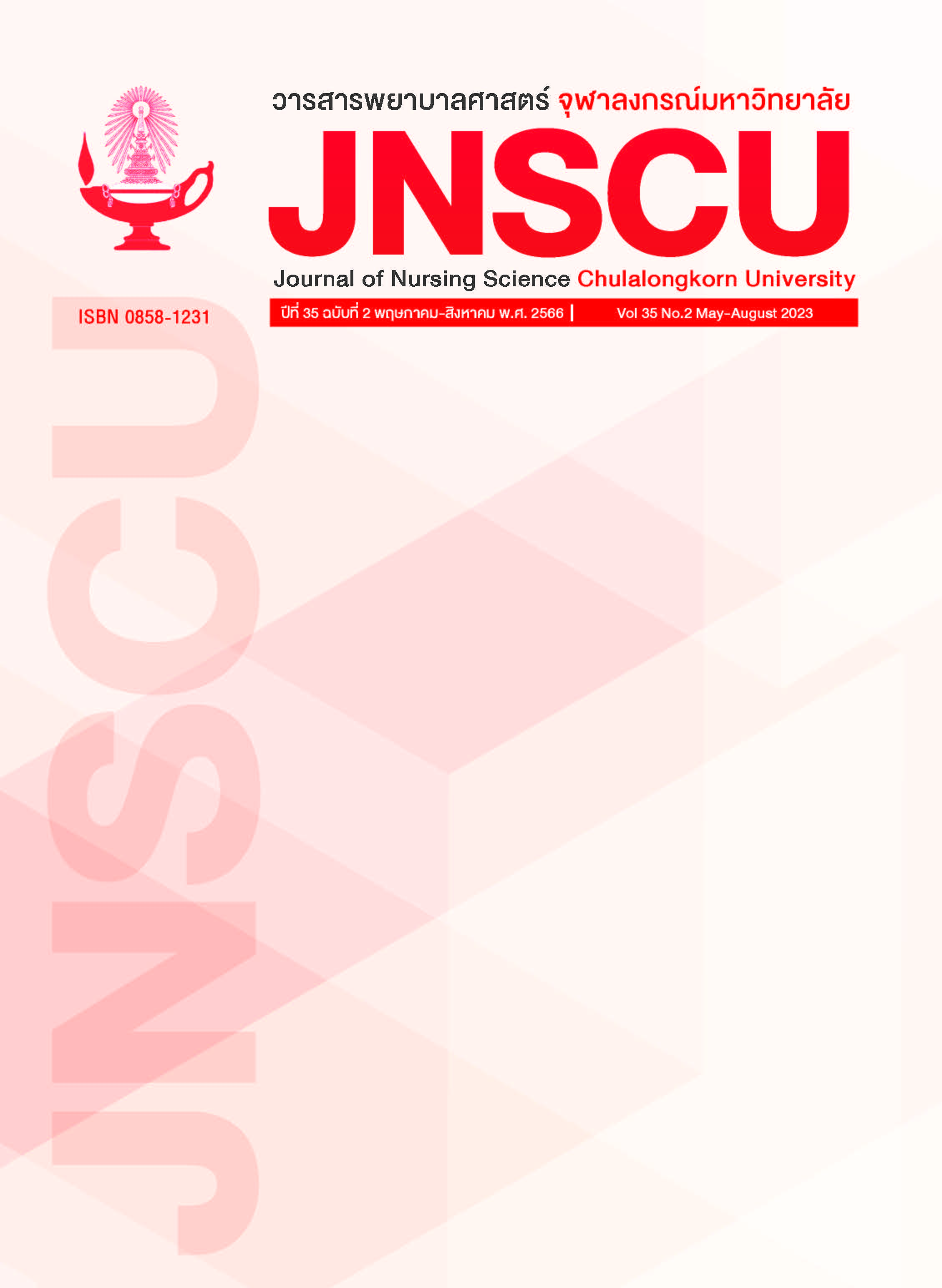Factors Related to Uncertainty in Breast Cancer Survivors
Main Article Content
Abstract
Purpose: To study the factors associated with uncertainty in illness among breast cancer survivors.
Design: Descriptive correlation research.
Methods: The participants were one hundred and thirty-five of female breast cancer survivors aged 20 to 60 years. The instruments used for data collection included the personal information questionnaire, the Mischel’s Uncertainty in Illness Scale: Community form, Fear of Cancer Recurrence Inventory short-form, health literacy, social support. and Memorial Symptom Assessment Scale: MSAS-SF questionnaires. Data was analyzed using Pearson’s production-moment correlation.
Results: The study findings revealed that breast cancer survivors had a moderate level of uncertainty in illness (=69.04, SD=11.78). Education level was significantly negatively correlated with uncertainty in illness (r=-400, p<.05). There was a significant positive correlation (r=.324, p<.05) between symptom distress and uncertainty in illness, but a significant negative correlation (r=.380, p<.05) between fear of cancer recurrence and uncertainty in illness in breast cancer survivors.
Conclusion: Nurses can assessment these factors such as symptoms, symptom distress, and fear of cancer recurrence, which can affect uncertainty in illness among breast cancer survivors. It will help healthcare providers in developing nursing care plans to prevent uncertainty in illness and complications in the future.
Article Details

This work is licensed under a Creative Commons Attribution-NonCommercial-NoDerivatives 4.0 International License.
ลิขสิทธิ์ของบทความที่ตีพิมพ์เป็นของวารสารพยาบาลศาสตร์ จุฬาลงกรณ์มหาวิทยาลัย ทั้งฉบับตีพิมพ์เป็นรูปเล่มและเอกสารออนไลน์
References
Siegel RL, Miller KD, Wagle NS, Jemal A. Cancer statistics, 2023. CA Cancer J Clin [Internet]. 2023; 73(1):17- 48. Available from: doi:10.3322/caac.21763.
American Cancer Society [ACS]. Cancer treatment and survivorship facts & figures 2019-2021. Atlanta: American Cancer Society; 2019.
Kim SH, Lee R, Lee KS. Symptoms and uncertainty in breast cancer surviv ors in Korea:differences by treatment trajectory. J Clin Nurs [Internet]. 2012; 21(7-8):1014-1023. doi:10.1111/ j.1365-2702.2011.03896.x.
Fallowfield L, Jenkins V. Psychosocial/survivorship issues in breast cancer: are we doing better?. J Natl Cancer Inst [Internet]. 2015; 107(1):dju335. Available from: doi:10.1093/jnci/dju335.
Vickberg SM. The Concerns About Recurrence Scale (CARS): a systematic measure of women's fears about the possibility of breast cancer recurrence. Ann Behav Med [Internet]. 2003;25(1):16-24. Available from: doi:10.1207/S15324796 ABM2501_03.
Fredette SL. Breast cancer survivors: concerns and coping. Cancer nursing. 1995;18(1):35-46.
Sivarux C, Pongthavornkamol K, Wattanakitkrileart D, Thaticharoensin S. Factors predicting quality of life in breast cancer survivors at 1 year post treatment and thereafter. Thai Cancer Journal. 2012; 32(1):2-14. [in Thai].
Mishel MH, Braden CJ. Finding meaning: antecedents of uncertainty in illness. Nurs Res. 1988;37(2):98-127.
Shaha M, Cox CL, Talman K, Kelly D. Uncertainty in breast, prostate, and colorectal cancer: implications for supportive care. J Nurs Scholarsh [Internet].2008; 40(1):60-67. Available from: doi:10.1111/j.1547-5069.2007. 00207.x.
Ahmadidarrehsima S, Rahnama M, Afshari M, Asadibidmeshki E, Kalantari B. Assessment of the level of uncertainty and the factors affecting it in Iranian patients with breast cancer. La Prensa Medica. 2018;104(5).
Wonghongkul T, Dechaprom N, Phumivichuvate L, Losawatkul S. Uncertainty appraisal coping and quality of life in breast cancer survivors. Cancer Nurs. 2006; 29(3):250-257.
Sajjadi M, Brant JM, Bahri N, Abbaszadeh A, Rassouli M. Uncertainty in Illness in Iranian Patients with Cancer and its Related Factors: A Cross-Sectional Study. Austin Palliat Care. 2016;1(1):1002.
Hanucharoenkul S, Wongsunparat B, Wonghongsakul T. Factors influencing feelings of uncertainty in illness in cancer patients receiving radiotherapy. Nursing journal. 1991; 40(1):11–26. [In Thai].
Hall DL, Mishel MH, Germino BB. Living with cancer-related uncertainty: associations with fatigue, insomnia, and affect in younger breast cancer survivors. Support Care Cancer [Internet]. 2014;22(9):2489-2495. Available from: doi:10.1007/s00520-014-2243-y.
Sammarco A. Perceived social support, uncertainty, and quality of life of younger breast cancer survivors. Cancer Nurs. 2001; 24(3):212-219.
Gill KM, Mishel M, Belyea M, Germino B, Germino LS, Porter L, LaNey IC, Stewart J. Triggers of uncertainty about recurrence and long-term treatment side effects in older African American and Caucasian breast cancer survivors. Oncol Nurs Forum [Internet]. 2004;31(3):633-639. Available from: doi:10.1188/04.onf.633-639.
Reynolds R. Uncertainty in Illness and health literacy in pancreatic cancer patients [dissertations]. UT SON: Texas University; 2018.
Throngthieng W, Tanatwanit Y, Kunsongkeit W. Factors influencing uncertainty in illness among patients with cancer undergoing chemotherapy. The Journal of Faculty of Nursing Burapha University. 2020; 28(4):25-37. [In Thai].
Mishel, Merle H. The measurement of uncertainty in illness. Nursing research. 1981;30(5):258-263.
Simard S, Savard J. Screening and comorbidity of clinical levels of fear of cancer recurrence. J Cancer Surviv. 2015; 9(3): 481-91.
Janthathai A, Pongthavornkamol K, Wattanakitkrilert D, Soparattanapaisarn N. Factors predicting health–related quality of life among colorectal cancer survivors during 6 months to 5 years after treatment completion. Journal of Nursing Science. 2018; 36(4):52-65. (in Thai)
Wanitkun N, Pattaramongkolrit S, Vichathai C, Bhechrung B, Kloyahem S, Batterham R, et al. Thai health literacy [Internet]. Nonthaburi: Health Systems Research Institute. 2014 [cited 2019 Nov16]. Available from: http://kb.hsri.or.th/dspace/handle/11228/3987. (in Thai).
House JS. Work stress and social support. Addison-Wesley Educational Publishers. 1981.
Pomklang J. Factors predicting health promoting behaviors of breast cancer survivors in extended survivorship [dissertations]. Bangkok: Chulalongkorn University; 2013. (in Thai)

